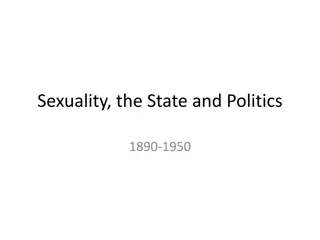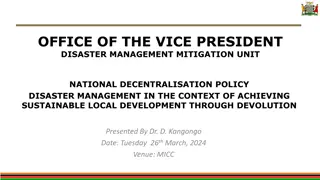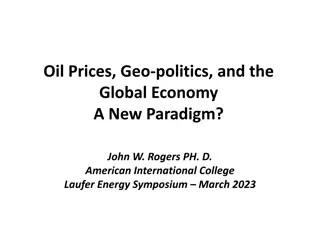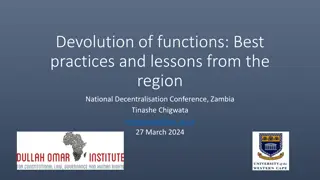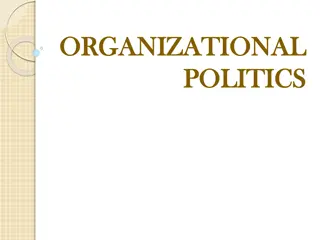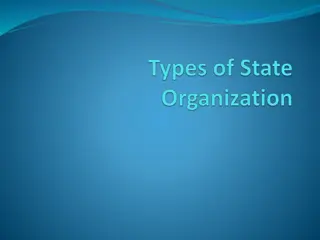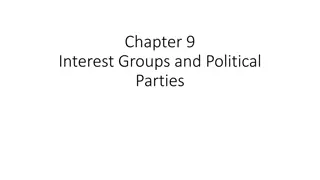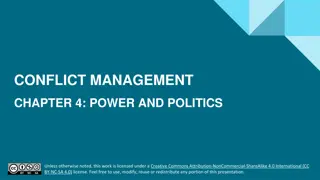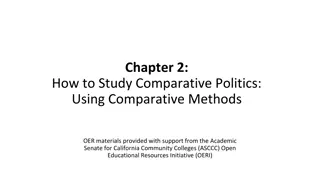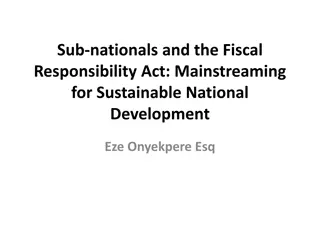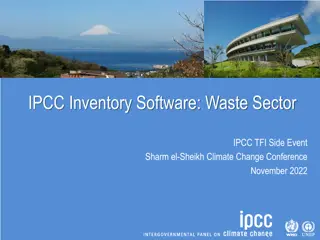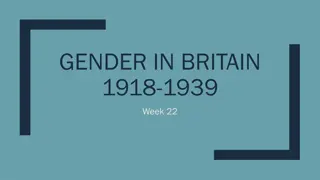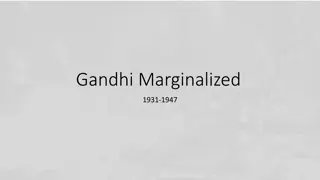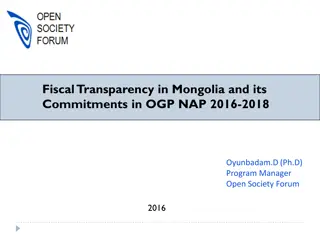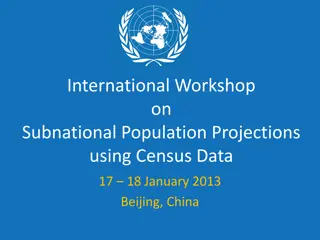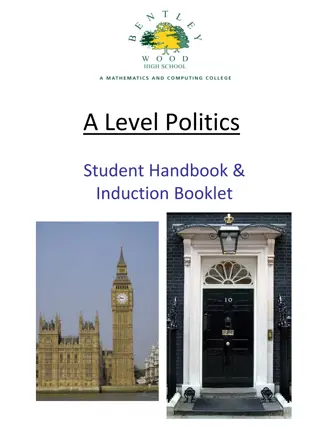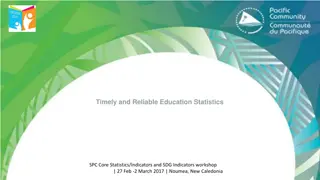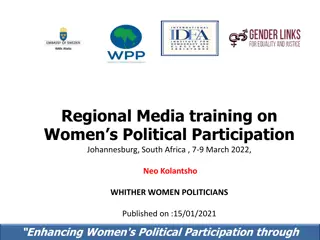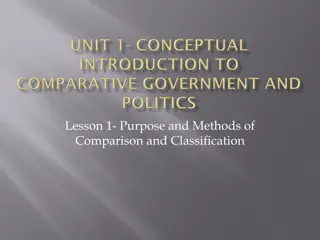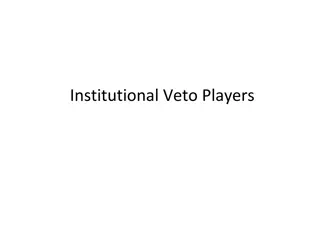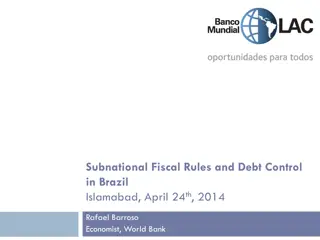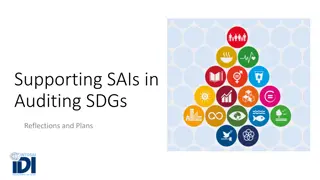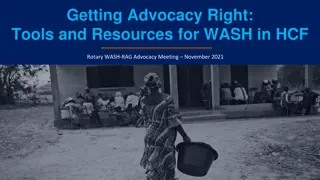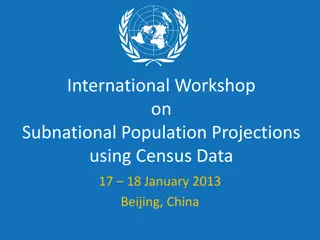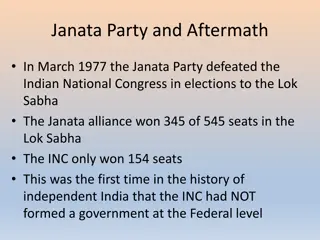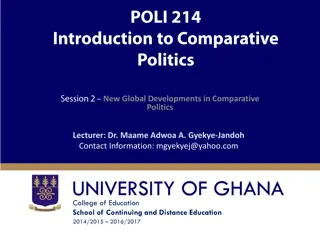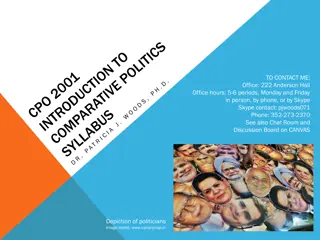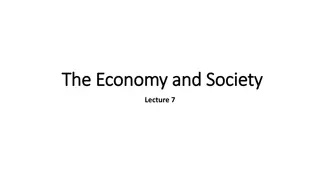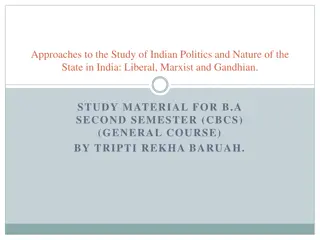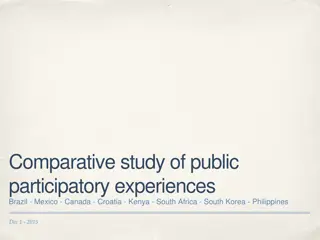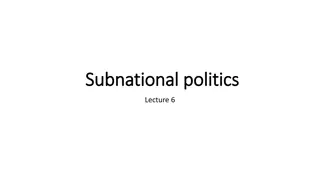INSTITUTIONAL GOVERNANCE FRAMEWORK
Currently, there is a lack of formal structure in the Institutional Housing Governance Framework (IHGF) within the public service system, leading to inefficiencies in managing institutional housing policies. This absence has resulted in deteriorating state assets, unmet housing demands, and ineffect
0 views • 17 slides
Perspectives on Sexuality, State, and Politics 1890-1950
Explore the complex dynamics of sexuality, state power, and political influences between 1890-1950 through historical images and quotes. This collection delves into issues such as lynching and the sexualization of Southern politics, the marginalization of homosexual individuals, and the management o
1 views • 25 slides
Disaster Management and Local Development Through Devolution
The presentation outlined the importance of disaster management in the context of achieving sustainable local development through devolution. It emphasized the need for effective subnational planning, mainstreaming of disaster risk reduction, and financing for disaster relief. The concept of devolut
5 views • 21 slides
Disaster Management and Sustainable Local Development Through Devolution
The presentation explores the integration of disaster management into subnational planning for achieving sustainable local development through devolution. It emphasizes the importance of decentralization, mainstreaming disaster risk reduction, urban areas' resilience, and financing for disaster reli
3 views • 21 slides
Global Energy Dynamics: Oil Prices, Geo-politics, and Economic Shifts
Explore the interplay between oil prices, geo-politics, and the global economy in a new paradigm. Key themes include the dominance of fossil fuels, challenges in transitioning to renewables, and the impact of geopolitical events on energy markets. Dive into discussions on the Ukraine war's effects,
4 views • 36 slides
Devolution of Functions: Best Practices in Subnational Governance
Understanding the importance of function assignment (FA) in subnational governance is crucial for effective decentralization. By learning from other countries and adopting a progressive FA framework, subnational governments can better achieve local, national, and sustainable development goals. The p
0 views • 14 slides
ORGANIZATIONAL POLITICS
Organizational politics involves informal efforts to influence, align interests, and allocate resources, leading to consequences like stress and decreased performance. Individual and organizational factors play crucial roles in shaping these dynamics.
0 views • 13 slides
Overview of Unitary, Confederal, and Federal States
Unitary, confederal, and federal states each have distinct characteristics regarding the distribution of power between central and subnational governments. Unitary states have centralized governance, while devolved states like the UK grant autonomy to subnational entities. Decentralized states trans
0 views • 22 slides
Industrialization and Its Impact on Politics and Society in Western Europe
Industrialization spread through Germany and western Europe in the late 19th century, bringing about significant changes to politics and society. Governments implemented reforms to improve workers' lives, consumerism influenced the middle class and working people, and mass political movements aimed
0 views • 23 slides
Terrorism: A Global Threat in International Politics
The rise of terrorism as a global menace is a significant factor in contemporary international politics. Fueled by advancements in technology and ideology, terrorism poses a formidable challenge, exemplified by events like the 9/11 attacks. Efforts are needed to combat terrorism on both national and
0 views • 24 slides
Understanding Interest Groups and Political Parties in American Politics
Interest groups play a significant role in American politics, aiming to influence government decisions through lobbyists and various strategies. They represent different interests such as economic, public, and intergovernmental. Lobbyists engage with federal branches and judicial institutions, utili
0 views • 7 slides
Understanding Power, Politics, and Conflict Management in Organizations
Explore the dynamics of power, authority, leadership, and politics within organizations, delving into how individuals and groups influence each other's actions and decisions. Learn about the various bases of power, common power tactics, and ethical considerations in using power and politics in the w
3 views • 23 slides
Understanding the Scientific Method in Comparative Politics
Exploring the scientific method in political science and comparative politics reveals the systematic approach to acquiring knowledge through observation, hypothesis testing, and analysis of outcomes. Adherence to rules of inference is crucial for validity in scientific research, enabling researchers
0 views • 28 slides
Fiscal Responsibility Act & Sustainable Development Nexus
Sustainable development integrates environmental health with economic progress. Achieving SDGs requires fiscal responsibility at all levels of governance. Subnational fiscal irresponsibility impacts national growth. It is crucial to manage public resources effectively to attain sustainable developme
0 views • 48 slides
IPCC Inventory Software Enhancements for Waste Sector Emissions Estimation
Explore the latest enhancements in the IPCC inventory software related to waste sector emissions estimation. Major updates include subnational disaggregation, Tier 3 methods, wetlands supplement, and improvements in worksheet structure and layout. The software allows for detailed estimation of green
1 views • 10 slides
Evolution of Media Influence on Politics
The evolution of mass media and its impact on politics is explored, highlighting the important role of media events, high-tech politics, and the development of media politics through print and broadcast media. The government regulation of the broadcast media, as overseen by the FCC, is also discusse
4 views • 20 slides
The Impact of Female Suffrage on Interwar Politics in Britain (1918-1939)
The period between 1918 and 1939 in Britain saw significant changes in politics, feminism, and society due to the granting of female suffrage. The Representation of the People Act of 1918 led to a flurry of legislation aimed at improving the status and welfare of women, such as the Sex Disqualificat
0 views • 14 slides
Gandhi's Marginalization in Indian Nationalist Politics from 1931-1947
The 1930 Salt Satyagraha propelled Gandhi into the heart of nationalist politics, challenging colonial rule. However, by the end of the decade, the tide shifted away from his influence towards a more conventional political landscape dominated by power negotiations and elections, leading to Gandhi's
4 views • 11 slides
Fiscal Transparency in Mongolia: OGP NAP 2016-2018 Commitments
Explore the assessment of fiscal transparency in Mongolia and its commitments in the Open Government Partnership National Action Plan (2016-2018). The content includes results of the Open Budget Survey, Subnational Budget Transparency Survey, recommendations, and evaluations of budget transparency a
0 views • 19 slides
Subnational Population Projections Using Ratio Method: Advantages and Variations
The ratio method, particularly the constant share and shift-share variations, is commonly used for projecting small area populations when data for the component method are lacking. It involves holding the smaller area's share of the parent population constant or allowing for changes over time. Care
1 views • 12 slides
A-Level Politics Student Handbook & Induction Booklet
A Level Politics aims to provide a balanced education in politics and understanding of the UK's political landscape. The course covers basic political ideas, structures, and processes, as well as global politics topics like global governance and regionalism. To succeed, students must engage with cur
0 views • 13 slides
Various Definitions of Politics and Their Significance
Scholars have struggled to define politics universally, leading to various definitions highlighting its nature and scope. Definitions range from politics as the art of possible to the struggle for power and the governing of men. Each definition sheds light on different aspects of politics, such as t
0 views • 17 slides
The Politics and Ethics of Knowledge Production in Migration Studies by Sari Hanafi
This insightful study delves into the politics and ethics surrounding knowledge production in migration studies. It explores the normativity of migration studies, identity politics, and universalism, while emphasizing the importance of ethics and epistemic community. The discourse also touches upon
0 views • 16 slides
Pacific Education Development Framework Workshop Overview
The Pacific Education Development Framework workshop held in Noumea, New Caledonia focused on timely and reliable education statistics, data challenges, and SDG indicators. The event emphasized the need to utilize indicators at regional, national, and subnational levels to address data challenges in
0 views • 8 slides
Empowering Women in Politics: Overcoming Financial Barriers
Addressing the financial challenges hindering women's political participation, this story advocates for funding initiatives to support female candidates. By highlighting the barriers faced, it urges for assistance such as subsidies and dedicated funding to encourage more women to enter politics. The
0 views • 10 slides
Comparative Government & Politics Course Overview
Explore the purpose and methods of comparison and classification in the AP Comparative Government & Politics course. Understand the importance of studying diverse political systems such as those of the United Kingdom, Russia, China, Nigeria, Mexico, and Iran. Engage in country fact sheets, multiple-
0 views • 19 slides
Understanding Federalism and Devolution in Government Structures
Federalism encompasses the division of sovereignty between territorial levels, while devolution grants powers to subnational governments with the right to recall them. This approach is evident in countries like India. The structural components of federalism involve geopolitical division, independenc
0 views • 64 slides
Subnational Fiscal Rules and Debt Control in Brazil
This presentation discusses the subnational fiscal rules and debt control framework in Brazil, highlighting historical bail-outs and the current performance of subnational finance. It covers revenue assignment, expenditure distribution, and details of past bail-out programs. The context outlines Bra
0 views • 32 slides
Supporting SAIs in Auditing SDGs: Reflections and Plans
SAIs play a crucial role in auditing SDGs to ensure high-quality audits of partnerships. Various SAIs and funding partners are actively involved in supporting this initiative. The story so far includes audits of preparedness and implementation of SDGs, with performance audits supporting 73 SAIs and
0 views • 14 slides
Understanding Comparative Politics: Power, Influence, and Political Phenomena
Politics involves power and influence, where individuals strive to achieve their goals by influencing others or breaking free from external influences. Political science delves into the study of power and political phenomena, while comparative politics focuses on analyzing political dynamics within
0 views • 21 slides
Advocacy Strategies for WASH in Healthcare Facilities
Empower your advocacy efforts with tools and resources for Water, Sanitation, and Hygiene (WASH) in healthcare facilities. Learn about operational and governance advocacy, use the WASH in HCF Advocacy Toolkit, create advocacy goals, and target audiences effectively. Explore advocacy messaging, messe
0 views • 19 slides
Subnational Population Projections Workshop Highlights
The International Workshop on Subnational Population Projections discussed methods for preparing subnational projections using a bottom-up approach and integrating them into national projections. The session also covered the use of Spectrum software to generate subnational projections and steps invo
0 views • 35 slides
The Janata Party Era in Indian Politics: A Snapshot of Change and Challenges
The Janata Party's rise and fall in Indian politics from 1977 to 1980 marked a significant shift as it defeated the long-standing Indian National Congress. The alliance faced internal struggles, including leadership disputes and corruption charges that led to its downfall. Despite its short duration
0 views • 10 slides
New Global Developments in Comparative Politics Since the 1980s
The lecture by Dr. Maame Adwoa A. Gyekye-Jandoh explores new global developments in Comparative Politics since the 1980s, covering topics like rapid industrialization in Asia and the collapse of communism in the Soviet Union and Eastern Europe. Students are introduced to key concepts such as the Com
0 views • 20 slides
Politics in Museums: A Comprehensive Exploration
Delve into the realm where museums and politics intersect, examining the dynamics of power, ideology, legitimacy, and rationality. Discover how politics operates within museums, addressing who the key actors are, the subjects of engagement, societal interest levels, and the specific arenas where dec
0 views • 10 slides
Understanding Comparative Politics: Field Overview and Specializations
Comparative politics involves studying domestic politics across different states and nations, with a focus on comparison and analysis. The field distinguishes itself from American Politics, International Relations, and Foreign Policy, emphasizing an in-depth look at state-society dynamics within spe
0 views • 27 slides
Understanding the Interplay of Economy, Politics, and Society
Exploring the connections between politics, economy, and society, this lecture delves into the influence of economic systems like capitalism and socialism on political structures. It discusses how economic conditions shape politics and social divisions, emphasizing the intertwined nature of these as
0 views • 15 slides
Approaches to Study of Indian Politics: Liberal, Marxist, and Gandhian Perspectives
Political Science encompasses various approaches such as Liberal, Marxist, and Gandhian for studying Indian politics. Scholars have explored the nature of the Indian state post-independence, focusing on democratization, social heterogeneity, and class dynamics. The Marxist approach views the state a
0 views • 14 slides
Comparative Study of Public Participatory Experiences in Various Countries
This study compares public participatory experiences in Brazil, Mexico, Canada, Croatia, Kenya, South Africa, South Korea, and the Philippines, evaluating how each case defines public participation, distinguishes between access to budget information and participation processes, and categorizes insti
0 views • 13 slides
Centralization vs Decentralization: A Comparative Analysis
This lecture delves into the dynamics of centralization and decentralization in subnational politics, exploring the benefits of each system, differences between federal and unitary government structures, challenges in reconciling territorial differences, reasons for the increasing popularity of cent
0 views • 15 slides

